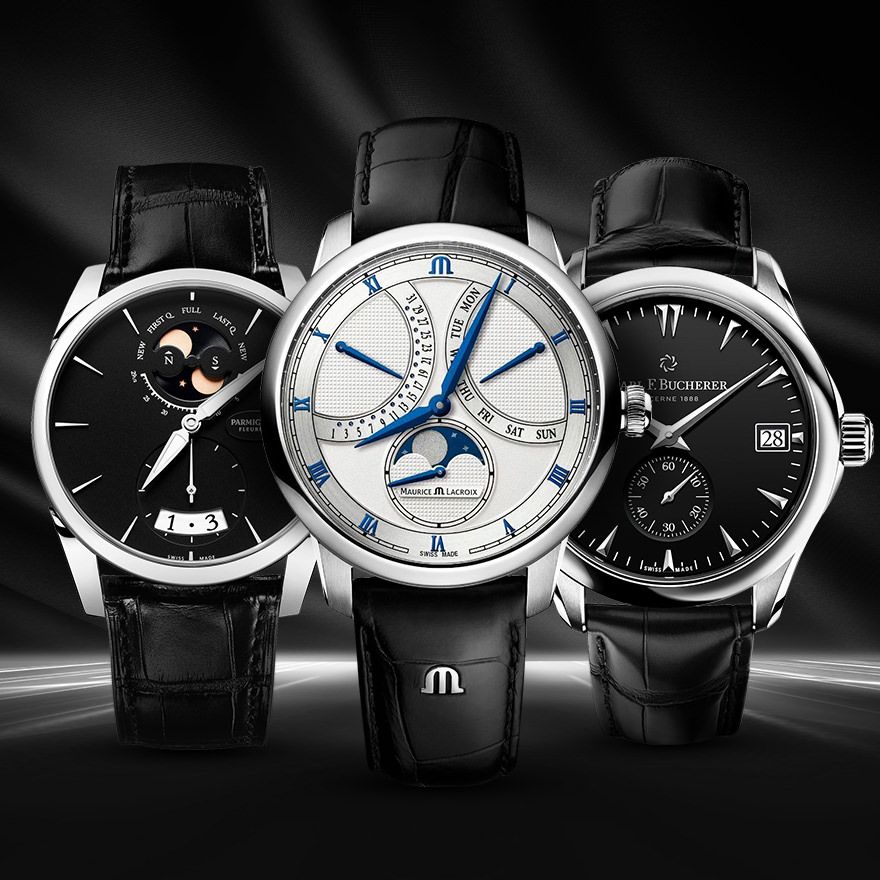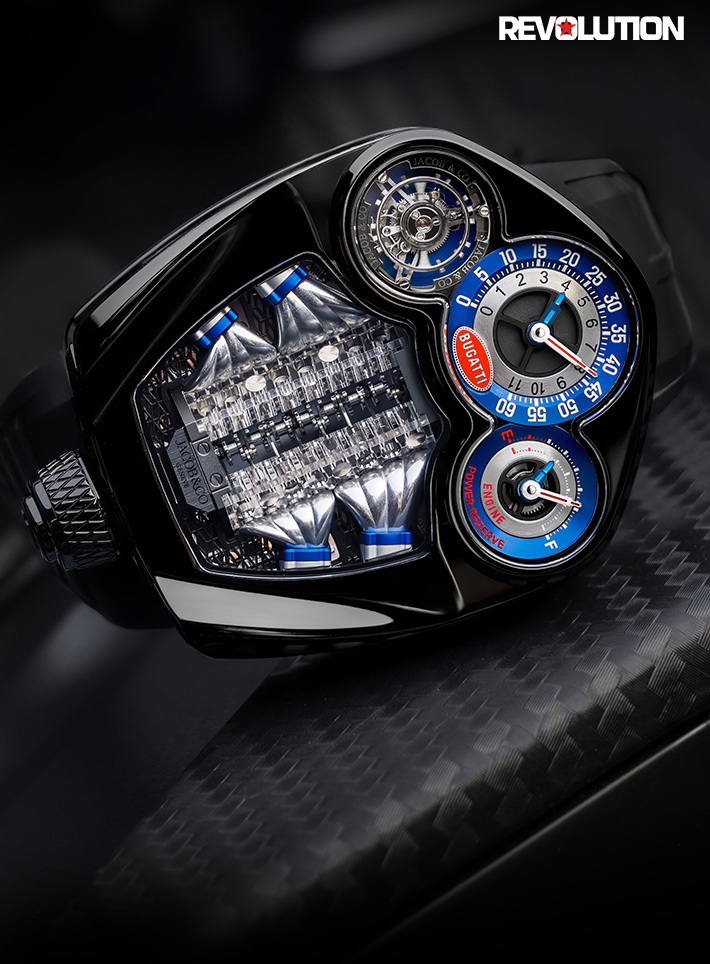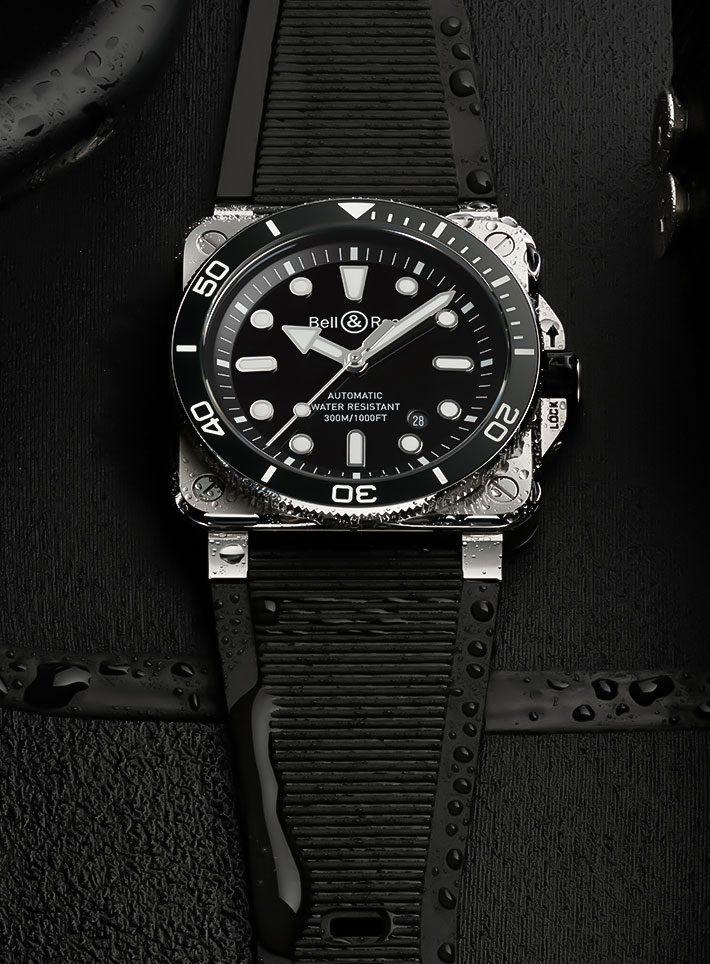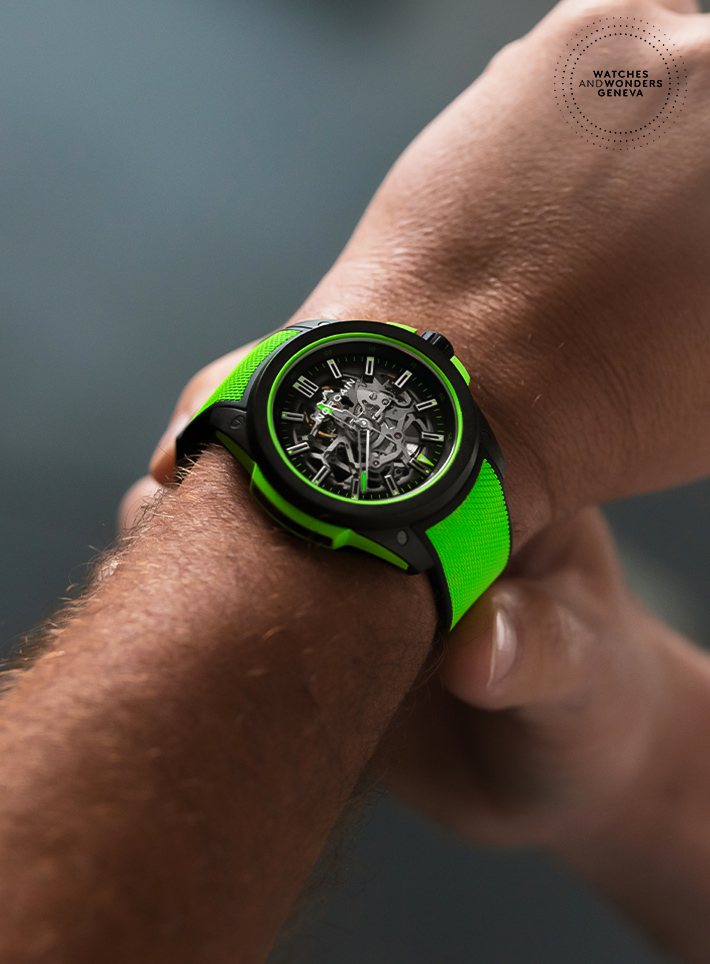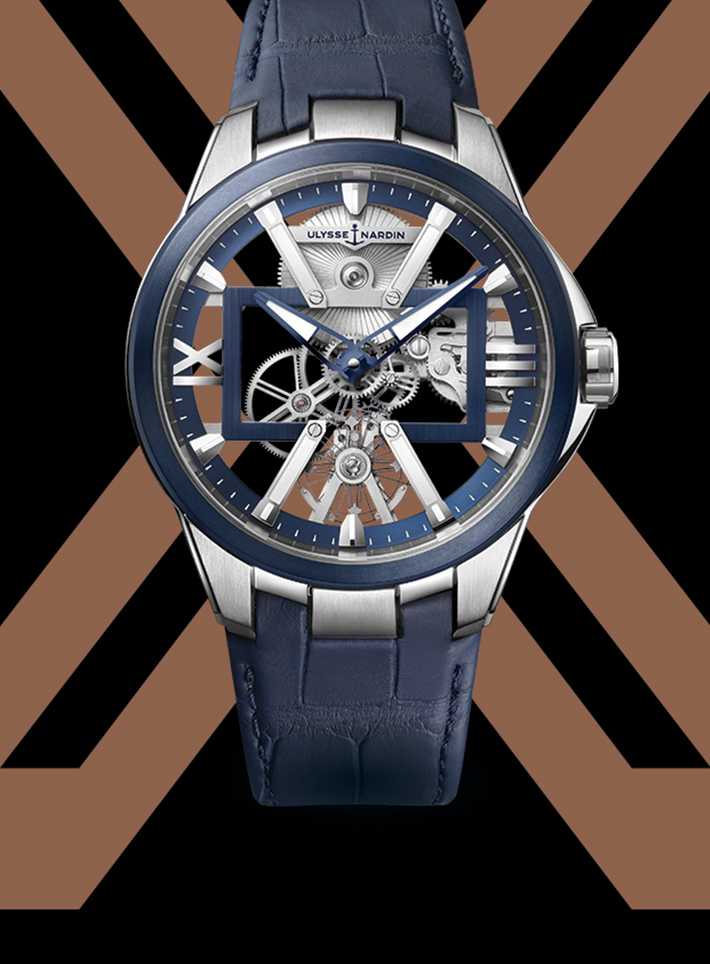FeatureDials That Dazzle: Materials And Techniques That Elevate A Watch Dial To Art
Watchmakers have been trying to outdo each other for centuries now when it comes to watch design. While many timepieces provide a multitude of functions, what really catches the eye about any watch is its dial. We explore some innovative techniques and unconventional materials that have been used to create the watch faces of some of our favourite timepieces
May We Recommend
Evolving from mere time-tellers to statement-makers that catch the eye and get the heart racing, watches have indeed come a long way. Many timepieces present superlative utilitarianism, offering the wearer a multitude of functions from chronographs on the simpler end of the spectrum to moon phases, perpetual calendars and minute repeaters. But sometimes all you really need is for your watch’s dial to stand out. While dials come in colours aplenty, some watchmakers pushed the envelope, creating dials from hitherto unused materials that had the horological world’s attention. Let us explore some materials and techniques that truly ‘dial’ up the timepieces they are a part of.
Precious Metals And Alloys: Pieces Of The Earth’s Soul
Do you feel like having a bit of a sheen on your wrist, and gold seems too flashy? Bronze should be your material of choice, then. Though many watchmakers have jumped on board this trend that’s taken the world by storm in the past few years, producing some spectacular bronze editions that win big, there are a few who’ve dared to used this material on the dial as well. For most connoisseurs, the draw is when this alloy develops a unique patina over time, which gives it an antiquated appeal. The Oris Big Crown Pointer Date Bronze edition is one such watch that makes good use of this material. The dial of this watch is treated with chemicals and then laminated with matte lacquer. This ensures that each dial’s finish turns out quite different than the next, giving every owner a truly one-of-a-kind timepiece.
To read more about the aviation-themed Oris Big Crown Pointer Date Bronze edition, click here
Another precious metal that is rarely seen on dials is platinum. Stronger and more durable than gold, and subtler to boot, platinum is a stunning dial material that is worth your while if you’re looking for that restrained yet luxurious touch. From the famed Constellation collection comes Omega’s platinum offering—the Constellation Globemaster Co-axial Master Chronometer. The platinum dial of this watch exhibits a ‘pie pan’ design that gives it added dimension, inspired by the very first Constellation model released in 1952. The indices and hands are crafted from 18-karat white gold filled with blue enamel. Even the blue leather strap comes with 950 platinum stitching.

All that glitters might be gold, but a material that’s emerged as its new face has a more delicate touch—pink or rose gold. If you want a timepiece that exudes nothing but luxury, sophistication and glamour, a watch with a rose gold dial is something you should definitely invest in. While rose gold is often relegated to the realm of women’s watches, there is a masculine timepiece whose angular appearance and bold presence is bound to win admirers. With a dial crafted from 18-karat rose gold, the Bulgari Octo Finissimo watch presents indulgence in a rather slim avatar. The soft-coloured dial looks eye-catching and is incredibly legible. It has bold black numerals at 12 and six, baton hour markers to denote the rest of the hours and a small seconds sub-dial at seven o’clock—all in black. Its highlight is its unbelievable thinness—coming in at only 2.23mm thick. The 40mm case, crown and bracelet are also crafted from this indulgent material.
The use of silver is a rarity among timepieces, with most watchmakers favouring metals that are easier to work with. However, silver has a romanticism that is truly unmatched. Crafted from this stunning material is the Zenith Pilot Type 20 Extra Special Silver watch, which has one of the most eye-catching dials in Zenith’s Pilot line of watches. Made with brushed silver, it mimics the riveted façade of the fuselage of World War II-era military planes. The large Arabic numerals on the watch face, which give the timepiece an unparalleled vintage look, have been made entirely out of Super-LumiNova. The hands have also been covered with the material, ensuring that you can keep time even when flying in low-light conditions. The watch has a large diameter of 45mm, so you can rest assured that all eyes will be on the silver glinting on your wrist, and its caseback is embossed with the Zenith flying instruments logo. The ratcheted crown is fashioned in such a way that it’s easy to set time even while wearing gloves—as pilots do. As an added benefit, this watch, with its silver everything, is sure to keep vampires and werewolves away!
You can read more about the fascinating Zenith Pilot Type 20 Extra Special Silver by clicking here
Captivating Crafts: Hands Of An Artist, Heart Of A Watchmaker
Harbouring the mystique and glory of the cosmos, watches with aventurine dials are beautiful to behold if you are fascinated by the night sky. A material that has been growing in popularity in watchmaking, aventurine was discovered by Italian glassblowers in Venice in the 17th century, although some experts believe that its history is rooted in more ancient times. Red copper ruby glass, along with purpurin glass, is used to make this exquisite material. When cobalt is added to the glass, which is originally brown or red, the glass magically turns to a beautiful blue. Flecks of copper are then added, which shimmer like stars in the sky. Aventurine is notoriously difficult to work with, especially considering how delicate the material is—for every dial that the watchmaker manages to create, there are at least five that end up breaking. A fine example of this exquisite and painstaking craft is the H. Moser & Cie. Endeavour Perpetual Moon Concept, whose aventurine dial will always remind you to keep your eyes heavenwards.
Gem-setting on dials is also an artful technique requiring deftness and extraordinary skill, and leads to results that are both luxurious and fascinating. Gems on a dial convert a simple timepiece into tasteful joaillerie, and who wouldn’t covet that? Gemsetters usually set each precious stone onto the watch one by one painstakingly beautifying the watch one dazzling gem at a time. Of all the precious gems in the world, right atop the pinnacle sits the multi-faceted diamond. Few things have captured our imagination the same way—from the pages of our history books beset with glorious civilisations and rich kings to wedding proposals and daring heists. Diamonds have become an extraordinary part of the human narrative. We’ve chosen the Girard-Perregaux Cat’s Eye Plum Blossom Jewellery where the dial has been paved with 361 brilliant-cut diamonds—totalling 2.5 carats. The bezel and buckle of the watch are also bedazzled with diamonds—exuding grace and luxury.

While using lacquer on a metal disc to create the dial is pretty common—a practice as old as the art of watchmaking itself—the technique we’ve chosen to present is unique to one particular country, and that’s Japan. The Grand Seiko Urushi Elegance timepiece has a dial that’s beyond riveting, all because of a technique that requires the utmost patience and an eye for detail—the Urushi lacquering technique. Though decorative lacquer originated in China thousands of years ago, it began to be used widely during the 8th century in Japan. The varnish used in this particular Japanese lacquer is derived from the Urushi tree, native to Japan and poisonous to touch in its raw form. Colour is added to the base lacquer. Several layers of the material are brushed onto the dial and left to dry, giving the dial a beautiful depth and vibrant amber colour. For these particular watches, the Urushi is harvested from trees grown in and around the town of Joboji that lies under Mt Iwate, the volcano that dominates the skyline above Grand Seiko’s Shizuku-Ishi Watch Studio. The mountain’s jagged lines inspire the abstract pattern on the dial. Furthermore, the traditional Maki-e technique is used by Urushi master Isshu Tamura to create the hour markers and the ‘GS’ lettering, using 24-karat gold powder, which are then polished to give them a shimmering appearance.
High-Tech Materials: The Vanguards Of Innovation
Pushing the envelope is nothing new for watchmakers who try every material, technique and design under the sun to grab the attention of horologists the world over. A brand that’s been doing this with much panache is none other than Panerai. A watch that checks all the boxes and more is the Submersible Marina Militare Carbotech, and the inclusion of carbon here is no gimmick at all. Carbon is itself incredibly lightweight and resistant to corrosion, making it the perfect material to use for a diver’s watch. The carbon used in the case of the watch is actually Panerai’s patented carbon composite ‘Carbotech’—where thin sheets of carbon fibre are fused together along with a polymer at extremely high temperatures. Carbotech is stronger than regular carbon fibre and has a marbled appearance, which also lends the dial a camouflage appearance—a nod to its militaristic leanings. Each case and dial looks a tad different from the next thanks to the myriad patterns formed by the fused carbon fibre. If you’re looking for a chunky, robust watch whose dial is sure to be a source of envy, look no further than the Submersible Marina Militare Carbotech.
H. Moser & Cie. is not far behind when it comes to innovation, with watch designs that are bold and eye-catching. A great example of the intensive research and development that go into their watchmaking is the Venturer Concept Vantablack. The dial of this watch makes use of the Vantablack material (‘VANTA’ is short for ‘vertically aligned carbon nanotube arrays’), which absorbs up to 99.96 percent of visible light. This makes it one of the darkest substances known to humankind today. With only timekeeping hands seen on the dial, this is the purest expression of minimalist, elegant design if there ever was one. Understated yet evocative, the Venturer Concept Vantablack welcomes you to the dark side.
You can read more about the watch that features the blackest of black dials by following this link
Unconventional Materials: Approaching Dials Differently
As the horological world bourgeons, many watchmakers are trying to go against the grain to make their watches extraordinarily unique. These watches are not just glorious to behold but make for scintillating talking points. A watch that comes to mind when we say this is the Corum Heritage Coin, first introduced to the world in 1964—a worthy collectable for any horologist worth their salt. As the name suggests, the dial is, in fact, a perfectly polished coin—the historic American $20 Double Eagle coin in 22-karat gold, stamped with the Seal of Liberty. Sometimes nicknamed the ‘Presidential Watch’, this watch was purportedly worn by a few presidents of the United States such as Lyndon B Johnson, Richard Nixon, Jimmy Carter, George Bush Sr and Bill Clinton. It was also donned by other illustrious names including renowned artist Andy Warhol. The black hands add a dose of legibility to the glittering dial. This watch truly exemplifies the phrase ‘greater than the sum of its parts’.

You can read more about the Corum Heritage Coin watches by clicking here
What do you do if you want a little piece of the heavens strapped to your wrist and aventurine glass is a bit too glittery for your taste? A few watchmakers took this quite literally and made watches that are truly out of this world. We introduce to you the Parmigiani Tonda 1950 Special Edition Météorite ‘Abyss Blue’, whose dial is crafted from (no surprises there) a meteorite! The talented watchmakers at Parmigiani Fleurier took a cross-section of an actual meteorite and gave it a series of acid baths. This brought out the varied textures of the crystalline structures that made up the space rock. The cool blue colour of the dial, which takes on different shades as the light hits, is owing to a galvanic surface coating. Isn’t it fabulous that something that adorned the sky will now adorn your wrist?

Many watchmakers experiment with metals and alloys, but what we rarely see on dials is wood. Yes, that’s not a typo. There are some watches that present wooden dials, and a brand that creates these dials skilfully is Corum. The brand has a varied collection of watches that exhibit teak wood dials—a nod to teak’s traditional use in yacht decks—making them perfect for these nautically-inspired watches. Presenting different shades of brown, ranging from chestnut to chocolate and, surprisingly, also the colour blue, the watchmaker truly wows. So, whenever you’re feeling a bit blue and you crave the freedom of the open seas, these watches can get you out of the woods.
To read more about Corum’s offerings that present wooden dials, click here
